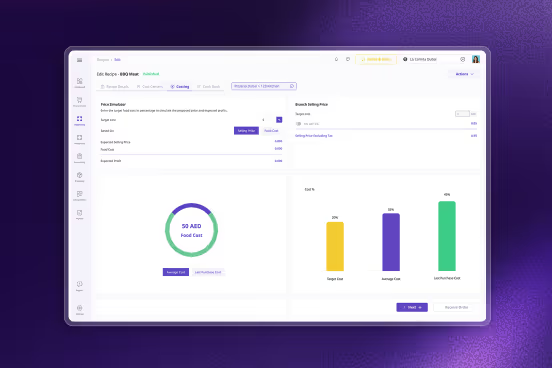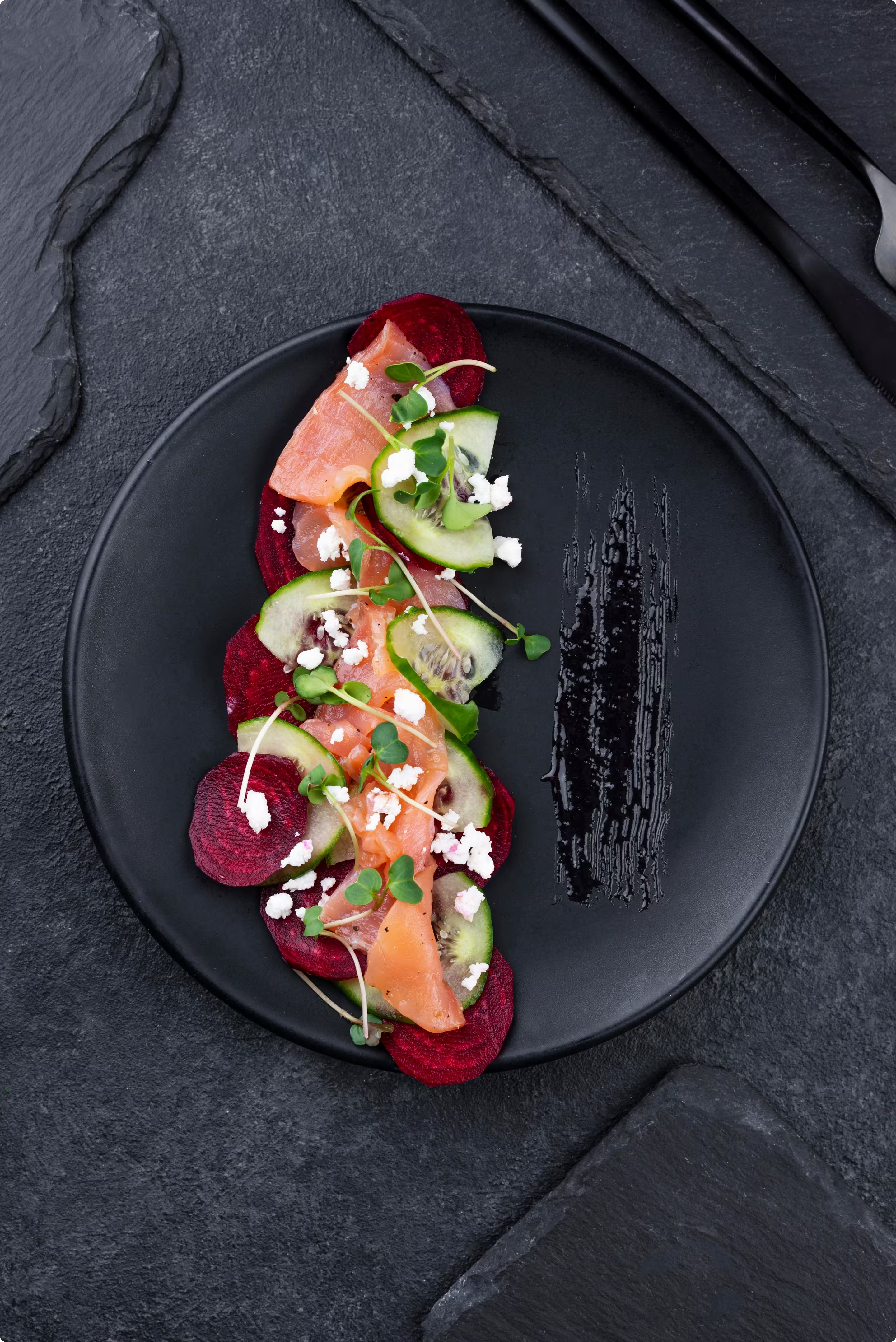Why Earning a Michelin Star Matters for Restaurants and How It Impacts Your Bottom Line
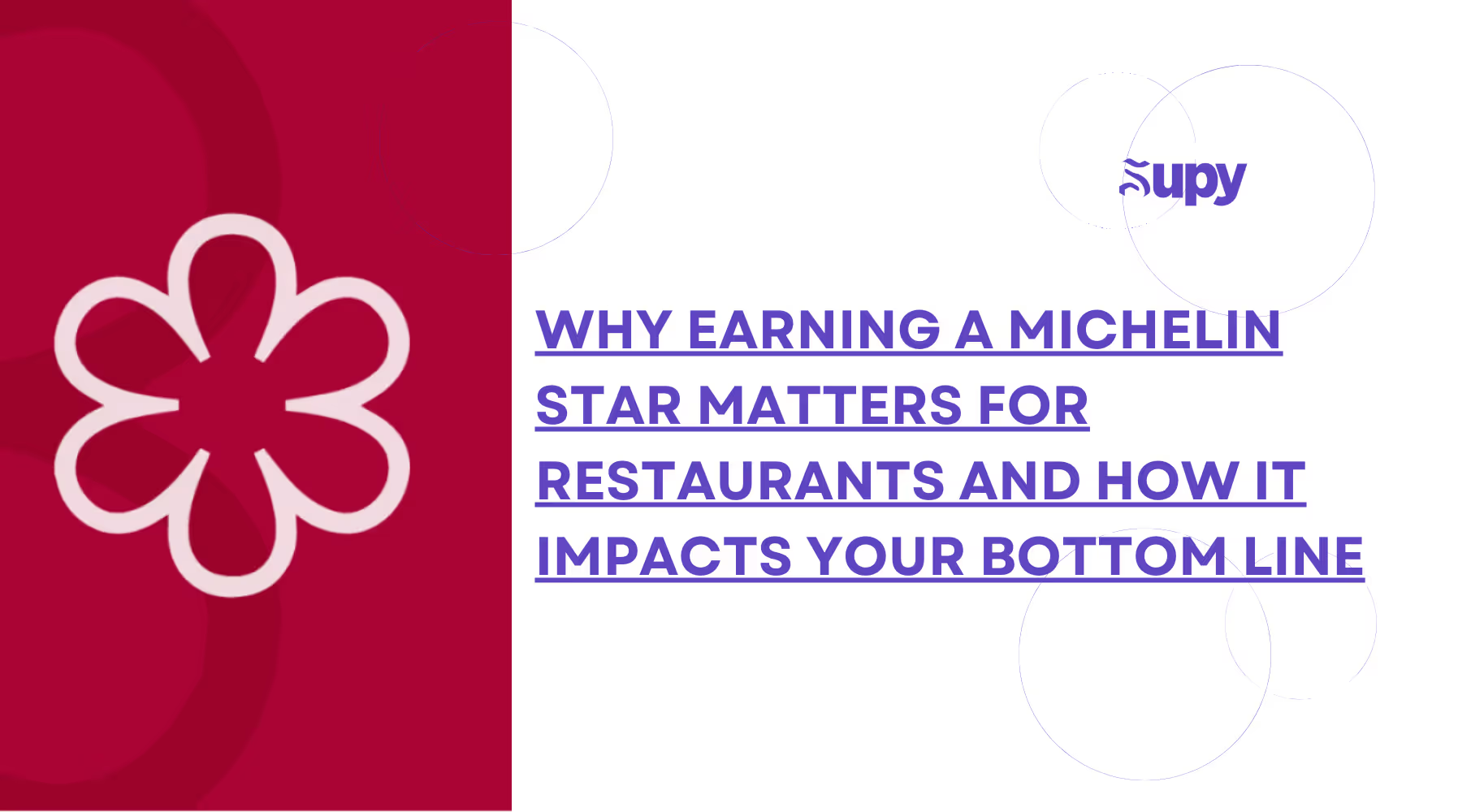
For decades, the Michelin Star has been the ultimate symbol of excellence in the restaurant industry, setting the standard for culinary mastery and exceptional dining experiences. Besides being a prestigious award, it has the power to elevate a restaurant’s reputation, attract a global clientele, and significantly boost revenue. A Michelin Star is a valuable achievement that plays a significant role in driving restaurant success and shaping your restaurant’s future.
The late Joël Robuchon, the most Michelin-starred chef in history, famously said,
"With one Michelin star, you get about 20% more business. Two stars, you do about 40% more business, and with three stars, you'll do about 100% more business."
For restaurant and F&B chain owners, earning a Michelin Star is a chance to stand out in a competitive industry and achieve lasting success.
In this blog, we’ll explore:
- What is a Michelin Star?
- The Importance of Michelin Stars in the Restaurant Industry
- How Michelin Stars Impact Profitability
- What It Takes to Meet Michelin Standards
- Tips to Improve Your Restaurant Operations for Michelin Standards
- Conclusion
- About Supy
Read on to learn how Michelin Stars can elevate your restaurant’s reputation, drive future profitability, and create a lasting impact in the industry.
1. What is a Michelin Star?
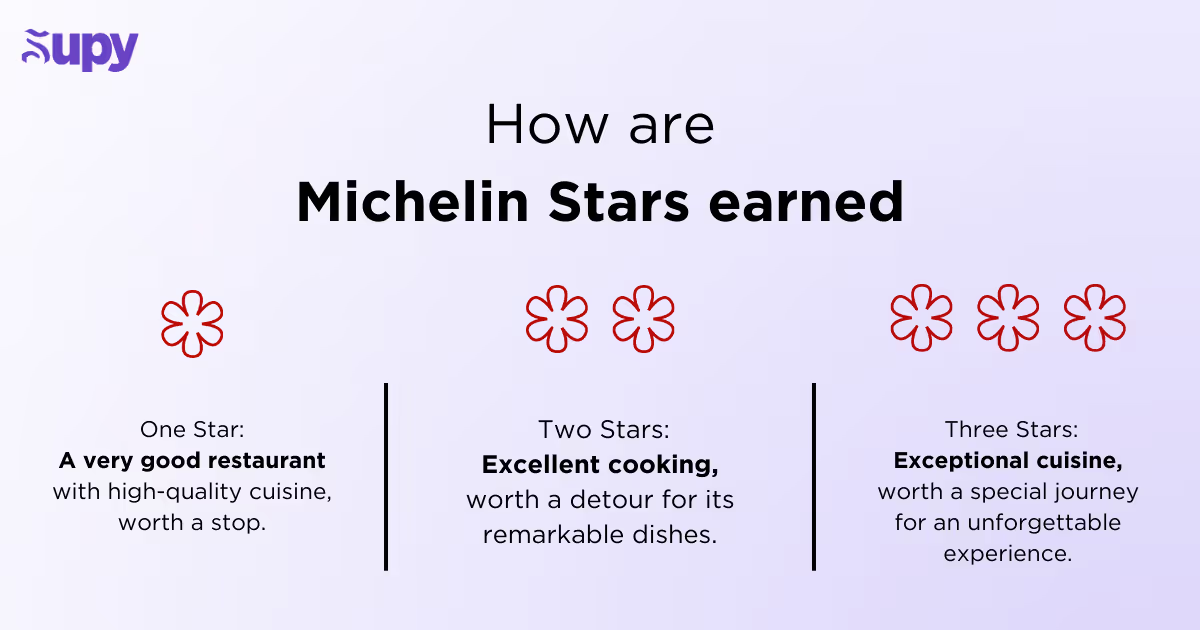
A Michelin Star is one of the most prestigious awards in the culinary world, given to Michelin restaurants that meet the highest standards of food quality, creativity, and service. The Michelin Guide, established over a century ago by the French tire company Michelin, uses a strict rating system to evaluate restaurants, awarding one, two, or three stars based on exceptional dining experiences.
Each star holds a unique meaning: one star signifies a very good restaurant, two stars indicate excellent cooking worth a detour, and three stars represent exceptional cuisine worth a special journey. Achieving even one star is a significant distinction that sets a restaurant apart in the industry.
Alongside stars, the guide also recognizes more affordable yet high-quality dining through its Bib Gourmand category, celebrating restaurants that offer great value for money while maintaining exceptional standards.
2. The Importance of Michelin Stars in the Restaurant Industry
Michelin Stars represent a level of excellence that can completely change how a restaurant is perceived. From building a strong reputation to attracting international customers, these stars hold incredible value for the restaurant industry.
Building Reputation and Prestige
Earning a Michelin Star significantly enhances a restaurant’s reputation in the world of fine dining. It assures customers they will experience good food and exceptional service, helping the restaurant stand out in a competitive market. Michelin Stars often generate media interest and industry recognition, providing restaurants with more visibility and credibility. This level of visibility can lead to increased demand and long-term success.
Attracting a Global Audience
A Michelin Star can position a restaurant as a must-visit destination for international diners, especially those seeking memorable guest experiences. People often travel from across the globe to enjoy Michelin-recognized establishments, knowing they will be treated to good food and unforgettable service. This global audience boosts revenue and solidifies the restaurant’s status as a culinary tourism hotspot. For many restaurant owners, this recognition opens doors to business growth on a much larger scale.
Boosting Employee Morale and Talent Recruitment
Michelin Stars spark interest among culinary professionals looking to work in top-tier environments. The prestige of a Michelin Star makes it easier for restaurants to recruit talented chefs and staff who are passionate about fine dining. This recognition also motivates existing employees, boosting morale and creating a strong, dedicated team committed to maintaining high standards.
On our podcast with Riad Abou Lteif, an architect turned chef and restaurant investor, we discussed the truth about Michelin Stars and their role in the industry. He shares that he sees them as "vital and important marketing tools.
3. How Michelin Stars Impact Profitability
Michelin Stars are a real driver of financial growth for restaurants. Earning a star can increase revenue, attract valuable customers, and improve long-term sustainability.
Here’s how they directly impact future profitability.
Increased Revenue Through Premium Pricing
One of the biggest financial benefits of earning a Michelin Star is the ability to charge higher prices. Diners are willing to pay more for the prestige and experience of dining at a Michelin-starred restaurant. For example, in Paris, earning a Michelin Star generates a price premium of about 25%. This means restaurants can significantly increase their revenue per customer without altering their seating capacity, which can have a positive impact on net income.

Additionally, Michelin-starred restaurants often create premium experiences, like tasting menus or exclusive wine pairings, that further boost their profitability. These offerings are closely related to the high expectations of diners seeking a luxurious experience, making Michelin restaurants highly profitable over time.
Attracting High-Spending Customers
Michelin Stars naturally attract diners who are looking for an exceptional dining experience and are willing to spend more to get it. These diners are often well-traveled and prioritize quality, making them a key demographic for profitable growth.
In cities with a strong food culture, like Tokyo and New York, Michelin-starred restaurants often become major attractions for tourists. Renowned establishments such as Sukiyabashi Jiro and Kanda in Tokyo, or Eleven Madison Park in New York, draw international diners seeking world-class meals. This influx of global visitors provides steady cash flow and creates a reliable source of revenue, particularly during peak travel seasons.
Long-Term Brand Value
Earning a Michelin Star builds credibility and trust with diners, encouraging loyalty and repeat business. This long-term brand value often leads to increased word-of-mouth referrals and positions the restaurant as a reliable choice for high-quality dining. The recognition is more than a one-time benefit. It continues to deliver value as the restaurant gains a loyal customer base and a strong reputation.
Restaurants that consistently maintain their stars also see additional opportunities for growth. Many Michelin-recognized establishments have expanded their operations or launched signature products, leveraging their reputation to open new revenue streams and improve their net profit margin over time.
Streamlined Operations for Higher Profit Margins
Achieving Michelin standards requires restaurants to optimize their operations for precision and consistency. Every detail, from kitchen workflows to inventory control, must be carefully managed. Restaurants that meet these standards often find that improved operational efficiency reduces waste, enhances productivity, and positively impacts their net profit margin.
This level of attention to detail ensures that resources are used effectively, improving overall cash flow while maintaining the high standards required for Michelin recognition. Streamlined operations not only help meet Michelin-level expectations but also ensure long-term financial health.
4. What It Takes to Meet Michelin Standards
Earning a Michelin Star is one of the greatest achievements for a restaurant, but it’s also a challenge that demands relentless dedication to excellence. The Michelin Guide awards stars based on strict criteria, evaluating every aspect of the dining experience. To understand what it takes to meet these standards, it’s important to first look at what each star represents.
One Star
A restaurant with one Michelin Star is described as “a very good restaurant in its category.” This means it consistently delivers high-quality dishes with excellent technique and ingredients. While it may not offer the complexity or innovation seen in higher-starred establishments, it stands out for its precision and mastery within its niche.
Two Stars
Two Michelin Stars signify “excellent cooking that is worth a detour.” Restaurants at this level showcase exceptional skill and creativity, with chefs crafting refined dishes that balance innovation and technique. Dining here becomes a special experience, offering flavors and presentations that justify going out of one’s way.
Three Stars
Three Michelin Stars are the ultimate recognition, awarded for “exceptional cuisine that is worth a special journey.” These restaurants deliver a dining experience that transcends food itself, combining artistry, creativity, and meticulous attention to every detail. From the ingredients to the atmosphere, everything is executed flawlessly. Restaurants with three stars often become destinations for food enthusiasts worldwide.
Michelin inspectors follow five key criteria to evaluate restaurants. Meeting these standards requires a combination of technical expertise, creativity, and consistency.
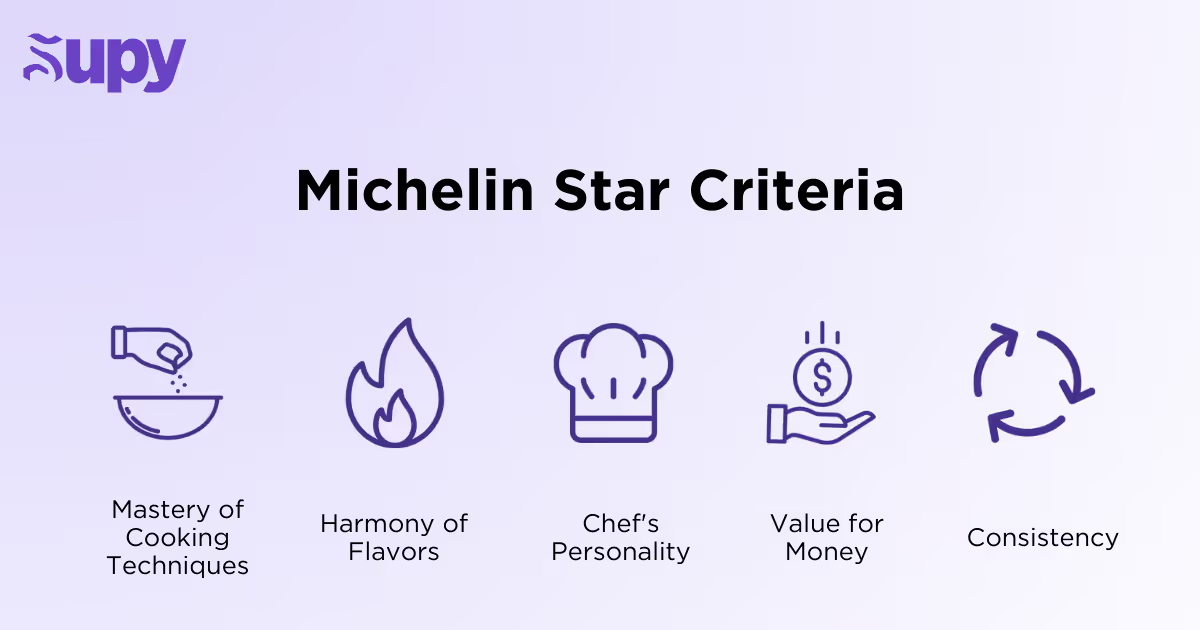
- Quality of Ingredients: The foundation of any Michelin-starred dish is its ingredients. Restaurants must use fresh, high-quality, and often seasonal produce that elevates the flavor and presentation of every dish. Sourcing premium ingredients is critical to standing out.
- Mastery of Flavor and Technique: Precision in cooking is essential. Michelin inspectors look for menu items that highlight the chef’s expertise in extracting maximum flavor while demonstrating technical mastery. Every element on the plate, from sauces to garnishes, must be flawlessly executed.
- The Chef’s Unique Personality: A Michelin-starred dish is also about creativity and individuality. Chefs must infuse their personal style and vision into their cuisine, offering diners something they won’t find anywhere else. This might include innovative flavor combinations or modern interpretations of classic dishes.
- Value for Money: The Michelin Guide also considers whether the overall dining experience is worth the price. This doesn’t mean restaurants must be expensive but that the quality, creativity, and service justify the cost. Guests should leave feeling the experience was worth every penny.
- Consistency: Consistency is one of the most important aspects of earning a Michelin Star. Restaurants must maintain the same exceptional quality across multiple visits and throughout the entire dining experience. From the first bite of the appetizer to the last taste of dessert, every detail must reflect excellence.
While the primary focus is on food, other intangible elements contribute to Michelin recognition. The atmosphere of the restaurant, the harmony of flavors, and the seamless service all play a significant role in shaping the overall experience. Michelin Stars are awarded annually, and inspectors often consider whether the restaurant has maintained or improved its standards compared to the previous year.
Meeting Michelin standards is no small task. It requires not just culinary excellence but also a dedication to creating a truly unforgettable dining experience.
5. Tips to Improve Your Restaurant Operations for Michelin Standards
Achieving Michelin standards demands a restaurant where every detail is carefully refined. Success at this level comes from dedication, consistency, and a strategic investment in excellence.
Here are actionable tips to help improve your operations and meet the high expectations of Michelin inspectors in today’s competitive dining landscape:
Tip #1 Prioritize Ingredient Sourcing
Start by building strong relationships with trusted suppliers to ensure you always have access to fresh, high-quality, and seasonal ingredients. Optimizing procurement processes, such as forecasting ingredient needs and negotiating better terms, can help reduce costs while maintaining quality.
Many Michelin-starred restaurants source locally, not only for freshness but also to craft menus that reflect their region’s unique flavors. Regularly evaluate your suppliers to maintain consistent quality and stay ahead of ingredient trends.
Tip #2 Invest in Staff Training
Your staff is the backbone of your restaurant, and their expertise can make or break the dining experience. Strong leadership plays a crucial role in guiding your kitchen and front-of-house teams to master their roles, focusing on precision, professionalism, and attention to detail. T
rain your staff to follow a clear vision and encourage continuous learning, such as enrolling chefs in advanced culinary programs or hosting workshops on service excellence for waitstaff. Well-trained employees, led by effective leaders, ensure consistency of the Michelin criterion.
Tip #3 Streamline Inventory Management
Efficient inventory management is essential to maintaining consistency and reducing waste. Use modern inventory management tools like Supy to monitor stock levels, track ingredient usage, and avoid shortages.
Proper inventory control ensures you always have the necessary ingredients for your menu while keeping costs in check. An organized inventory system also helps reduce errors and improves overall kitchen efficiency.
Tip #4 Focus on Menu Development
Crafting a well-balanced, innovative menu is crucial for standing out, and menu engineering can play a vital role in its success. Regularly evaluate and refine your dishes to ensure they showcase both creativity and technical skill while analyzing item performance to identify high-profit and customer-favorite options.
Consider seasonal updates to highlight fresh ingredients and keep customers intrigued. Involve your team in the development process to brainstorm ideas, test recipes, and ensure every dish is perfected. Each item on the menu should reflect your restaurant’s unique identity and culinary vision while maximizing profitability.
Tip #5 Create a Seamless Customer Experience
To reach Michelin standards, your service and atmosphere are just as important. Focus on creating a welcoming and comfortable environment for diners while using customer feedback to continually refine the experience.
Train your staff to anticipate customer needs and handle special requests with care. From the moment guests walk in to the time they leave, every interaction should feel seamless and personalized. Pay attention to details like table settings, lighting, and even the music, as these elements collectively impact the dining experience.
6. Conclusion
Earning a Michelin Star can transform a restaurant’s reputation and success. It’s about more than just great food. It’s about delivering an unforgettable experience with every dish, every detail, and every interaction. Focusing on quality, consistency, and creativity not only brings you closer to Michelin standards but also helps you build a thriving business. Striving for excellence in every aspect of your restaurant will leave a lasting impression on your diners and set your restaurant apart.
7. About Supy
At Supy, we understand that running a restaurant at Michelin standards requires precision, consistency, and efficiency. Our inventory management software helps you streamline operations, reduce waste, and focus on delivering exceptional dining experiences.
Aspiring to earn a Michelin Star or simply looking to improve your restaurant’s performance? Book a demo today and discover how Supy can support your journey to success.
